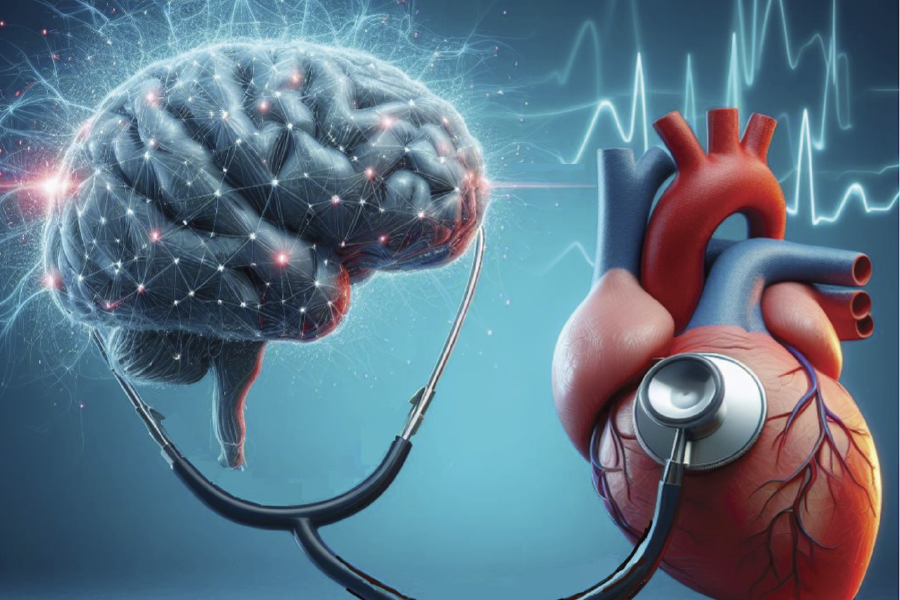Neurons can feel the pulse in the brain
Researchers at the Faculty for Biology and Preclinical Medicine of the University of Regensburg publish a study in Science

Neurons feel the pulse in the brain. Illustration: Luna Jammal using Microsoft Bing Image Creator + Affinitydesigner
Bernstein members involved: Veronica Egger
Interoception is the sensing of internal body signals, as opposed to the sensory perception of the external world, and thus informs the brain about the state of the body. Rhythmic bodily processes such as breathing, the heartbeat, or the pulsing of the gut may help keep brain activity organized. Indeed, it seems that how we think and see the world is affected by our heartbeat. We’ve known for a while that blood pressure is detected within the aorta and the heart itself. Now, neuroscientists at the university of Regensburg have found specific neurons that directly detect heartbeat-induced rhythmic movements of blood vessels in the brain and thus can feel the pulse within the brain.
“The whole project started with some really weird results from a completely different project looking at activity in the part of the brain that processes smell – the olfactory bulb. We kept seeing mysterious oscillatory electrical signals, even though we were not letting any signals in. There were hints of both non-biological and biological origins for these oscillatory signals, and things were getting more and more puzzling with every new observation” says Prof. Veronica Egger, who led the study. “Finally, it turned out that the brain tissue was responding directly to the rhythm of the pump we had attached to it to keep it supplied with blood.” This peristaltic pump causes pressure pulses within the blood vessels that happen to fit within the normal range of heartbeat-induced blood pressure variations within the brain. The researchers finally pinned the origin of the mysterious oscillations to so-called mitral cells, the principal neurons of the olfactory bulb. Now, if these neurons can sense the pump pressure rhythm and turn it into an electrical signal, can they then also sense the blood pressure pulse associated with the heartbeat? In other words, can they feel the pulse within the brain?
Dr. Luna Jammal, a senior researcher in Egger’s team, determined how exactly the pump-induced pressure pulsations are translated into electrical activity of the mitral cells: it turns out that there are special sensors on the mitral cells, fast mechanosensitive ion channels, which cause the cell to release a current whenever pressure around it changes. These sensors can be shut down by a tarantula toxin – and indeed when this toxin was used the weird oscillations stopped. As it happens, these types of sensors have only been recently discovered, earning researchers the Nobel Prize in 2021. Finally, Dr. Sebastian Bitzenhofer and Prof. Ileana Hanganu-Opatz at the University of Hamburg demonstrated that this sensing happens in real animals in association with heartbeat, not just in the isolated olfactory bulb.
It turns out that these heartbeat sensors are spread out all over the brain, and it is now clear that the pulse can be sensed directly in the brain. Why can it do this? “Nobody knows!” says Luna. “One possibility is that how your heart is beating could affect how you think and feel, and by having the sensors right there in the brain, the effect of the heartbeat on your thoughts can be almost instantaneous.”
The project was mainly funded by the Deutsche Forschungsgemeinschaft (DFG) (EG135/7-1, EG135/12-1).




